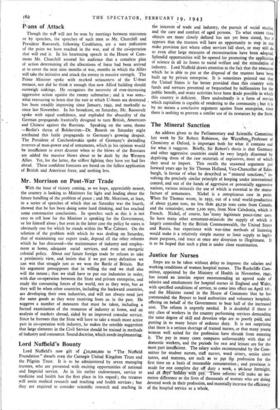Justice for Nurses
Steps are to be taken without delay to improve the salaries and working conditions of women hospital nurses. The Rushcliffe Com- mittee, appointed by the Ministry of Health in November, 1941, has issued an interim report recommending an agreed scale of salaries and emoluments for hospital nurses in England and Wales, with specified conditions of service, to come into effect on April tat ; and the Minister stated in the House of Commons that he has commended the Report to local authorities and voluntary hospitals, offering on behalf of the Government to bear half of the increased cost. The reform is urgently needed. It is doubtful if there is any class of workers in the country performing services demanding the same degree of skill and devotion who are so poorly paid, and putting in so many hours of arduous duty. It is not surprising that there is a serious shortage of trained nurses, or that many young women well suited for the profession have shrunk from entering it. The pay in many cases compares unfavourably with that of domestic workers, and the periods for rest and leisure are for the most part insufficient. The salary scales recommended by the Com- mittee for student nurses, staff nurses, ward sisters, senior sister tutors, and matrons, are such as to pit the profession for the first time on a basis of reasonable remuneration ; and provision is made for one complete day off duty a week, a 96-hour fortnight, and 28 d'ays' holiday with pay. These reforms will make an im- mense difference to the lives of thousands of women who are doing devoted work in their profession, and materially increase the efficiency of the hospital service as a whole.


























 Previous page
Previous page